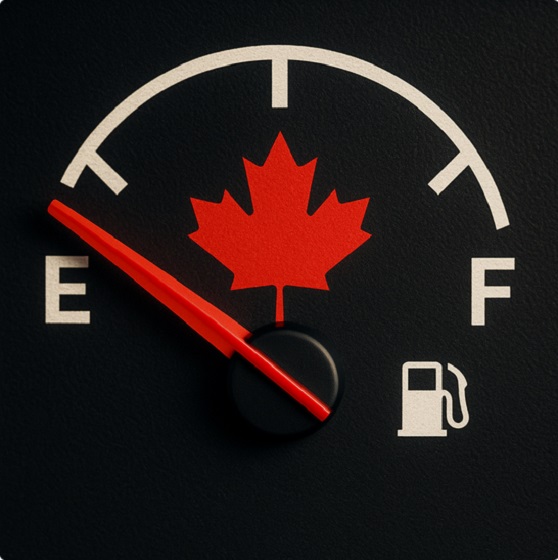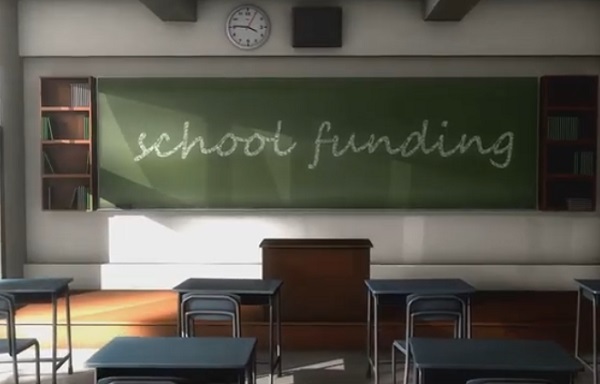Business
Enbridge to pay Bad River band $5.1M in Line 5 profits, move pipeline by 2026: judge
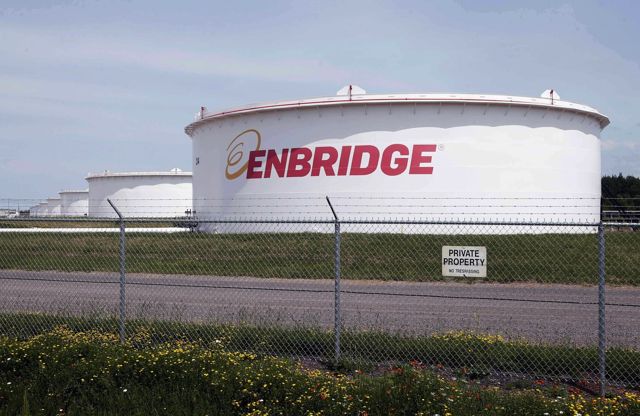
This June 29, 2018 photo shows tanks at the Enbridge Energy terminal in Superior, Wisc. A U.S. judge in that state has ordered the Calgary-based energy giant to pay an Indigenous band US$5.1 million and to remove the Line 5 pipeline from the band’s property within three years. THE CANADIAN PRESS/AP-Jim Mone
By James McCarten in Washington
Calgary-based Enbridge Inc. must pay an Indigenous band in Wisconsin more than US$5 million in Line 5 profits and relocate the controversial cross-border pipeline within the next three years, a U.S. judge says.
A rupture on territory that belongs to the Bad River Band of the Lake Superior Chippewa would constitute a clear public nuisance under federal law, district court Judge William Conley said in a decision late Friday.
But while the order affirms that Enbridge has been trespassing on Bad River land since 2013, when certain permits for the 70-year-old pipeline were allowed to lapse, it stops short of causing “economic havoc” with an immediate shutdown.
“The use of trespass on a few parcels to drive the effective closure of all of Line 5 has always been about a tail wagging a much larger dog,” Conley writes in his opinion.
In other words, there are “much larger public policy issues” surrounding cross-border pipelines like Line 5 that the band’s arguments, while valid, lack the power to overcome, he said.
Those issues “involve not only the sovereign rights of the band, but the rights of multiple states and international relations between the United States and Canada.”
Enbridge has already agreed to reroute the line, an essential energy conduit for much of the U.S. Midwest as well as Ontario and Quebec. But Conley wants that project completed more quickly than currently planned.
“Considering all the evidence, the court cannot countenance an infinite delay or even justify what would amount to a five-year forced easement with little realistic prospect of a reroute proceeding even then,” he wrote.
“The court will give Enbridge an additional three years to complete a reroute. If Enbridge fails to do so, the three years will at least give the public and other affected market players time to adjust to a permanent closure of Line 5.”
Enbridge’s lawyers continue to dispute the finding that the company is trespassing on Indigenous territory and intend to appeal the decision, and may also request a stay pending its outcome, said spokesperson Juli Kellner.
“Enbridge’s position has long been that a 1992 contract between Enbridge and the band provides legal permission for the line to remain in its current location,” Kellner said.
“Timely government permit approvals” would be necessary to complete the reroute within three years, while relocating the pipe currently on Bad River territory would take about a year, she added.
Any shutdown before then “would jeopardize the delivery of reliable and affordable energy to U.S. and Canadian families and businesses, disrupt local and regional economies, and violate the Transit Pipeline Treaty.”
Talks between the two countries have been ongoing for months under the terms of that treaty, a 1977 agreement that effectively prohibits either side from unilaterally closing off the flow of hydrocarbons.
In prior court documents, Enbridge has accused the band of being focused on a single outcome: the permanent closure of the pipeline on their territory “while refusing much less extreme alternative measures.”
The band argues that several weeks of spring flooding along the Bad River has washed away so much of the riverbank and supporting terrain that a breach is “imminent” and a shutdown order more than justified.
Enbridge insists the dangers are being overstated — and even if they were real, the company’s court-ordered contingency plan, which spells out the steps it would take, would be a far more rational solution.
Conley’s order Friday included tweaks to that plan to establish a more “conservative” threshold for the conditions that would trigger it, such as lower water levels and flow rates on the river.
“The court is particularly concerned that Enbridge’s plan does not account for inevitable delays that could occur due to weather conditions, supply and equipment problems and human error.”
Enbridge has also been rebuffed repeatedly in its efforts to perform remedial work on the site, which would include using sandbags and trees to fortify the riverbanks —decisions the band has defended as its sovereign right.
Heavy flooding that began in early April washed away significant portions of the riverbank where Line 5 intersects the Bad River, a meandering, 120-kilometre course that feeds Lake Superior and a complex network of ecologically delicate wetlands.
The band has been in court with Enbridge since 2019 in an effort to compel the pipeline’s owner and operator to reroute Line 5 around its traditional territory — something the company has already agreed to do.
But the flooding has turned a theoretical risk into a very real one, the band argued, and time is now of the essence.
Line 5 meets the river just past a location the court has come to know as the “meander,” where the riverbed snakes back and forth multiple times, separated from itself only by several metres of forest and the pipeline itself.
But it was clear both from Friday’s order and an in-person hearing last month, when Conley openly questioned the band’s motives, that he faults the band for rejecting Enbridge’s proposed plans to mitigate the danger.
“The band has refused to approve any of Enbridge’s remediation and prevention proposals, much less proposed even one project of its own to prevent or at least slow further erosion at the meander,” he wrote.
The neighbouring state of Michigan, led by Attorney General Dana Nessel, has been waging its own war against Line 5, fearing a leak in the Straits of Mackinac, the ecologically delicate waterway where the pipeline crosses the Great Lakes.
The economic arguments against shutting down the pipeline, which carries 540,000 barrels of oil and natural gas liquids daily across Wisconsin and Michigan to refineries in Sarnia, Ont., are by now well-known.
Line 5’s defenders, which include the federal government, say a shutdown would cause major economic disruption across the Prairies and the U.S. Midwest, where it provides feedstock to refineries in Michigan, Ohio and Pennsylvania.
It also supplies key refining facilities in Ontario and Quebec, and is vital to the production of jet fuel for major airports on both sides of the Canada-U.S. border, including Detroit Metropolitan and Pearson International in Toronto.
This report by The Canadian Press was first published June 17, 2023.
Automotive
$15 Billion, Zero Assurances: Stellantis Abandons Brampton as Trudeau-Era Green Deal Collapses

Carney issues memos, Joly writes letters, and Freeland hides abroad—while 3,000 Canadian workers pay the price for a green gamble built on denial and delusion.
Stellantis has announced they’re leaving Brampton. That’s it. End of story.
Three thousand workers. Gone. A manufacturing base gutted. A city thrown into economic chaos. And a federal government left holding a $15 billion bag it handed over like a drunk tourist at a rigged poker table.
The Jeep Compass—the very vehicle they promised would anchor Ontario’s role in the so-called “EV transition”—will no longer be built in Canada. Production is moving to Belvidere, Illinois. The same company that cashed billions of your tax dollars under the banner of “green jobs” and “economic transformation” has slammed the door and walked out. And no, this isn’t a surprise. This was baked into the cake from day one.
Let’s rewind.
In April 2023, under Justin Trudeau’s government, Chrystia Freeland—then Finance Minister—and François-Philippe Champagne, the Industry Minister, announced what they called a “historic” agreement: a multi-billion-dollar subsidy package to Stellantis and LG Energy Solution to build an EV battery plant in Windsor, Ontario.
It was sold as a turning point. The future. A Green Revolution. Thousands of jobs. A new industrial strategy for Canada. But in reality? It was a Hail Mary pass by a government that had already crippled Canada’s energy sector and needed a shiny new narrative heading into an election cycle.
And here’s what they didn’t tell you: the deal had no enforceable commitment to keep auto production in Brampton. There were performance-based incentives—yes—but only for the battery plant. Not for the Brampton assembly line. Not for the existing workforce. And certainly not for ensuring the long-term health of Canada’s domestic auto industry.
They tied this country’s future to a globalist fantasy. A fantasy that assumed the United States would remain under the control of climate-obsessed technocrats like Joe Biden. A fantasy that required a compliant America pushing carbon neutrality, electric vehicle mandates, and billions in matching subsidies for green infrastructure.
But in November 2024, Americans said no.
Donald Trump was elected president. And just as he promised, he tore Biden’s green agenda to shreds. He pulled out of the Paris Climate Accord—again. He dismantled the EV mandates. He unleashed American oil and gas. But he didn’t stop there. Trump imposed a sweeping America First manufacturing policy, pairing 25% tariffs on imported goods with aggressive incentives to bring factories, jobs, and supply chains back onto U.S. soil.
And it’s working—because the United States doesn’t strangle its industries with the kind of red tape, carbon taxes, and bureaucratic self-sabotage that Canada does. Energy is cheaper, regulations are lighter, and capital actually wants to stay. So when companies like Stellantis look at the map, it’s no contest.
Now Stellantis, like any rational corporation, is doing what any business does under pressure: protecting its bottom line. They’re shifting production to a country that rewards investment instead of punishing it, a country that actually wants to build things again. That’s Trump’s America—competitive, unapologetic, and open for business—while Canada clings to a collapsing green fantasy and wonders why the factories keep leaving.

So what does Canada do in response? Our Prime Minister, Mark Carney, issues a carefully scripted memo on social media—not action, not legislation, not binding commitments—just a memo—reassuring workers he “stands by” the auto sector while offering vague promises about future budgets and long-term resilience. Lets be clear Carney isn’t saving jobs; he’s eulogizing them. Those 3,000 positions aren’t “paused” or “in transition.” They’re gone. Finished. Packed up and heading south. No memo, no committee, no press conference is bringing them back.
Chrystia Freeland, the architect of this mess, isn’t around to answer for any of it. She’s been conveniently shipped off to Kyiv, far from the consequences of the green boondoggles she helped engineer

And Industry Minister Mélanie Joly? She’s doing what this government does best: issuing strongly worded letters, drafted by lawyers, polished by comms teams, and lobbed into the void like they carry any real weight. She’s threatening legal action against Stellantis—vague, undefined, and almost certainly toothless. As if a global automaker backed by EU investors and billions in international capital is going to flinch because Ottawa wrote them a nasty note.
But let’s be absolutely clear here—what legal action? What’s the actual mechanism Ottawa is threatening to use? This wasn’t a blank cheque handed to Stellantis. According to public records, The $15 billion deal was built around performance-based incentives, structured to release funding only if Stellantis delivered on agreed milestones: production output, sales volume, battery module manufacturing at the Windsor facility. If they didn’t meet those metrics, they wouldn’t get paid. That’s the public line. That’s the defense.
Opposition Calls for Accountability
Conservatives, led by Raquel Dancho, are demanding real accountability, a formal investigation, a full reopening of the House of Commons Standing Committee on Industry and Technology (INDU) under Standing Order 106(4).
This isn’t a symbolic gesture. It’s a procedural weapon. When invoked, 106(4) forces Parliament to reconvene the committee, even if the government doesn’t want to, and compels ministers and officials to testify under oath. That’s what Dancho and her colleagues, Ted Falk, Michael Guglielmin, and Kathy Borrelli, have done. Their letter, dated October 15, 2025, demands that INDU immediately examine the Stellantis debacle — the $15 billion taxpayer-funded subsidy that failed to secure a single guarantee for Canadian auto jobs.
The letter is explicit. It references Stellantis’ decision to move Jeep Compass production from Brampton, Ontario to Illinois, a move that puts 3,000 Canadian jobs at risk despite the billions handed to the automaker under the Trudeau-Freeland-Carney green industrial strategy. It details how the federal and Ontario governments offered over $15 billion to secure battery plant investments, but with no enforceable job protection clauses to safeguard workers at Stellantis’s Canadian operations.
It doesn’t stop there. The letter points directly at Mark Carney, accusing him of breaking his promise to “put elbows up” and negotiate a fair deal with President Trump. It notes that Carney’s October 7th White House visit yielded nothing but new U.S. tariffs on Canadian autos and lumber, while Stellantis and GM expanded their operations south of the border. “Mark Carney broke his promise,” the MPs write, “and his weakness abroad is costing Canadian jobs at home.”

Dancho’s accompanying tweet lays out the message clearly and without spin:
“Stellantis received up to $15 billion in taxpayer subsidies—with no assurances of job retention in Canada. Yesterday, Stellantis announced that they were moving production to the U.S. and investing $13 billion in their economy. Conservatives are calling to reconvene the Industry Committee to study this decision and learn how such a failure happened. While the Liberals pat themselves on the back for announcements and rhetoric, auto workers are being told that their jobs are on the chopping block. They deserve clarity.”
Dancho’s move changes the game. With the NDP gutted and no longer shielding the government in committee, the opposition finally has the numbers and the mandate to dig. Ministers like Mélanie Joly and François-Philippe Champagne will now have to answer, under oath, for the deals they signed. Officials from Innovation, Finance, and Employment Canada will be subpoenaed to explain what oversight, if any, was built into the Stellantis agreements.
Final thoughts
I wrote about this when the deal was signed, and I wasn’t guessing. I said it plainly: this $15 billion green industrial experiment was a reckless, ideological bet that depended entirely on Donald Trump not winning the presidency.
Now here we are. Trump’s back in office — and he’s gone even further than I predicted. He didn’t just rip up Biden’s climate agenda; he imposed broad “America First” tariffs across the board to drag manufacturing back onto U.S. soil. Twenty-five percent duties on Canadian and Mexican goods, combined with tax breaks and energy policies that make it cheaper to produce in America than anywhere else. That single move detonated the fragile logic behind Trudeau and Freeland’s so-called industrial strategy.
So Stellantis did what any corporation would do when faced with a government that punishes production and a neighbour that rewards it: it packed up and left. The company took billions in Canadian subsidies, thanked Ottawa for the free money, then announced a $13 billion expansion in the United States—under Trump’s protectionist umbrella.
Let’s be clear: when I bet, I bet smart. I hedge. I read the table. I make damn sure I’m holding something real. These people—the Liberal government—went all in with a high card and a hollow narrative, betting your tax dollars on a political fantasy. They thought they could bluff their way into an industrial renaissance while ignoring the shift happening just across the border.
And you want final thoughts? Here they are: I am absolutely sickened by the people responsible for this disaster and you know exactly who I mean. Chrystia Freeland, who vanished from Cabinet and failed up into some made up ambassador’s post, her entire political career a string of bailouts, virtue signals, and globalist pageantry. And François-Philippe Champagne, the man who handed out our tax dollars like Monopoly money and couldn’t negotiate a cup of coffee without being outplayed.
They won an election based on this. Based on lies. Based on phony climate promises and fake job projections and polls manipulated by the same Mainstream Media that cashes federal subsidy cheques while calling themselves journalists. Do you think they’re going to hold Champagne accountable? Do you think they’re going to track Freeland down between photo ops in Kyiv and ask how 3,000 Canadian families are supposed to pay their mortgage now?
Of course not. They’re all on the same payroll.
Well guess what, I’m not. I don’t take their money. I don’t need their approval. And I am not shutting up. Not now. Not until that committee gets answers. Not until those ministers are dragged before Parliament. And not until Chrystia Freeland and François-Philippe Champagne are fired for the betrayal they’ve inflicted on Canadian workers.
This isn’t over. Not by a long shot. I’m going to bang this drum until it splits. And every time they try to bury this story, I’ll be there digging it back up. You’ve been lied to. Robbed. Betrayed. And someone is finally going to answer for it.
So stay tuned. Stay loud. And for God’s sake, stay angry.
Business
Ford’s Whisky War

 Marco Navarro-Génie
Marco Navarro-Génie
One could do a whole series of opinion and research pieces on how poorly educated Canadian politicians are about economic and trade principles. Below is my latest on the topic, focusing on Doug Ford’s latest philistine tantrum. My next piece will be on Wab Kinew. Writing on their lack of discipline and poor habits can be a cottage industry for commentators.
Haultain’s Substack is a reader-supported publication.
To receive new posts and support our work, please consider becoming a free or paid subscriber.
Try it out.
When a politician pours whisky on the ground, it usually means she has run out of ideas.
A few weeks ago, in September, Ontario Premier Doug Ford staged a protest worthy of a talk-show segment. Before a union crowd in Brampton, he emptied a bottle of Crown Royal onto the stage and vowed its maker, Diageo, would “pay dearly.” He threatened to pull Crown Royal (and several ither brands) from LCBO shelves, declaring Ontario would use its market power to punish the distiller for closing its Amherstburg bottling plant.
It was a vivid scene, part theatre, part tantrum, and entirely revealing.
Diageo is one of the world’s largest producers of spirits and beer, headquartered in London, England. It owns more than two hundred brands, including Johnnie Walker, Guinness, Tanqueray, and Baileys, and sells in over 180 countries. The company was formed in 1997 through the merger of Guinness and Grand Metropolitan, and it inherited Crown Royal from the old Seagram portfolio. Diageo’s Canadian operations remain significant, with the Gimli, Manitoba distillery producing every drop of Crown Royal whisky sold worldwide. It’s a Canadian product.
Diageo’s decision was not an act of treachery but arithmetic. The company plans to close its Amherstburg facility by 2026, shifting bottling to Quebec and parts of the United States. Roughly two hundred jobs will vanish. For a town of twenty-three thousand, that is a deep cut. Yet Ford’s reaction transforms an industrial decision into a political drama. He recasts an economic adjustment as a moral betrayal, as if loyalty to Ontario were a debt every business must pay in perpetuity.
That sentiment plays well at partisan rallies. But in practice, it blurs the boundary between government and market. When politicians confuse the two, policy becomes a tool of temper rather than governance.
Once a premier signals that he will use public institutions like the LCBO as weapons, investors take note. And they should. They infer that Ontario’s business climate can change with the premier’s mood. Capital, unlike politicians, is dispassionate. It goes where rules are predictable and contracts honoured, not where leaders lecture firms for disobedience.
Markets, as Adam Smith observed, are a network of trust. Replace trust with coercion or shaming, and investment flows away as surely as whisky poured on the pavement.
Ford casts himself as the friend of “working people.” Yet his fury threatens workers far from Ontario. The whisky he attacked onstage is distilled and aged in Gimli, Manitoba, from prairie grain and Canadian labour. Eighty people work at that distillery. Thousands of farmers supply its rye and corn. If Diageo decides Canada has become a political hazard, those Manitoban jobs will be among the first casualties. A tantrum in Brampton can send a chill all the way to Lake Winnipeg.
This is the irony of populist economic nationalism: in defending a few hundred local jobs, it imperils thousands more across the whole federation. It’s thoughtless.
Ford’s rhetoric also clashes with his own record. When electric-vehicle battery ventures trimmed their job projections despite billions in subsidies, the premier offered understanding, not outrage. When Brookfield shifted parts of its business operations abroad, there was no rally, no public denunciation, no bottle hitting the floor. Evidently, corporate disloyalty is tolerable, until it involves whisky.
Such inconsistency is not a principle but an impulse. Governments that choose favourites create uncertainty for everyone. When rules bend to political sentiment, each firm wonders whether it will be next in line for punishment. And so the province that once competed for investment becomes a place investors compete to avoid.
If Ford truly wished to defend Ontario’s workers, he would ask why bottling in his province became uneconomic in the first place. The answer is not a mystery. Ontario carries high energy costs, heavy regulation, and steep land prices. Every company weighs those burdens. Threatening one firm for noticing them will not persuade others to stay.
Political anger cannot repeal common sense arithmetic.
The irony deepens because Crown Royal remains Canadian in every essential sense. Its grains, water, and labour are Canadian. Its distilling craft and heritage are Canadian. Ownership by a British firm changes the shareholder, not the spirit. Punishing that success because it offends provincial pride reduces patriotism to parochialism. The brand’s global reach is a quiet advertisement for Canadian skill, and it is an achievement to be respected, not vandalized.
The premier’s defenders will say he is merely standing up for Ontario workers. But bluster is not courage. Proper defence of working people lies in creating the conditions that let enterprise and local ingenuity flourish. When government swaps policy for theatre, it only feeds resentment and starves opportunity.
Economic freedom depends on restraint. Governments must regulate and tax modestly, but they must also know when not to act. Every unnecessary intervention signals risk. The LCBO should be a neutral marketplace, not a political cudgel. Once it becomes a stage for senseless retribution, the line between free commerce and state coercion dissolves.
Ontario’s grievance is understandable; its method is reckless. A government may lament job losses, negotiate incentives, or compete for reinvestment. It may not commandeer a marketplace to punish a decision it dislikes. In a constitutional order, power is exercised through law, not vendetta.
Amherstburg deserves sympathy. No question. Two hundred jobs lost in a small town is no abstraction. Yet the premier’s faux fury will not restore them. Instead, it risks ensuring that the next investor leaves quietly rather than risk the wrath of the premier and public humiliation. Markets remember humiliation longer than speeches.
Crown Royal will survive this episode. The whisky made in Gimli will continue to be sold worldwide, enjoyed by people who have never heard, and will likely never hear, of Ontario’s premier. But the image of a provincial leader pouring it out onstage will endure too. It is an emblem of how quickly cheap populism can trade reason for spectacle.
Ontario must decide what kind of province it wishes to be: a jurisdiction that welcomes enterprise, or one that punishes it when it moves. If every business is expected to pledge fealty to the premier’s emotions, the province will learn how swiftly loyalty evaporates.
When politics meddles in markets, both lose dignity. The government becomes a performer; the market, its prop. The result is neither freedom nor prosperity, only theatre.
Doug can pour out all whisky in Ontario, if he likes. The rest of the world will raise a glass to markets that keep their cool.
Haultain’s Substack is a reader-supported publication.
To receive new posts and support our work, please consider becoming a free or paid subscriber.
Try it out.
-

 International19 hours ago
International19 hours agoPoland’s president signs new zero income tax law for parents with two children
-

 Alberta1 day ago
Alberta1 day agoDiploma Exams Affected: No school Monday as ATA rejects offer of enhanced mediation
-

 International20 hours ago
International20 hours agoAustralian territory bans men from women’s prisons in national first
-

 Business10 hours ago
Business10 hours agoFord’s Whisky War
-

 Business1 day ago
Business1 day agoFederal Budget 2025: A responsible media would ensure Canadians know about the dismal state of federal finance
-

 Business1 day ago
Business1 day agoCanada has an energy edge, why won’t Ottawa use it?
-
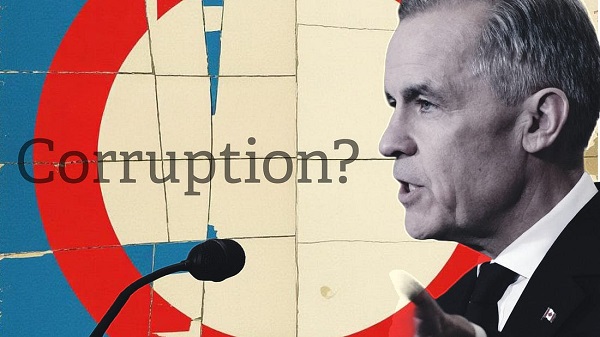
 Business1 day ago
Business1 day agoEthics on Ice: See You Next Year
-
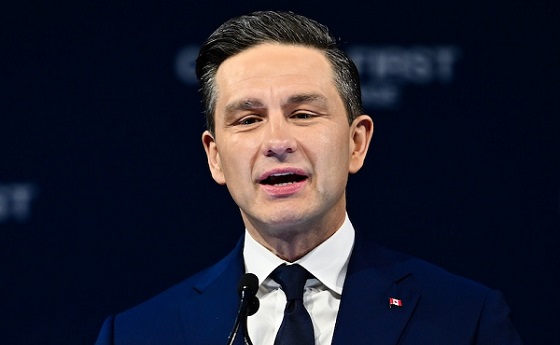
 National20 hours ago
National20 hours agoPoilievre accuses Canada’s top police force of ‘covering up’ alleged Trudeau crimes




